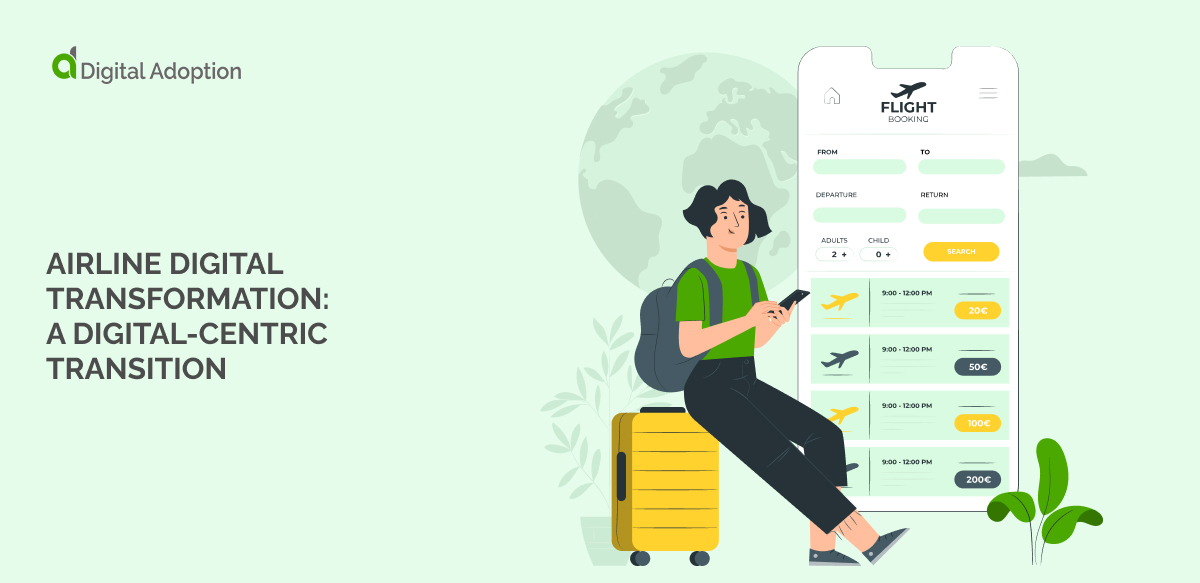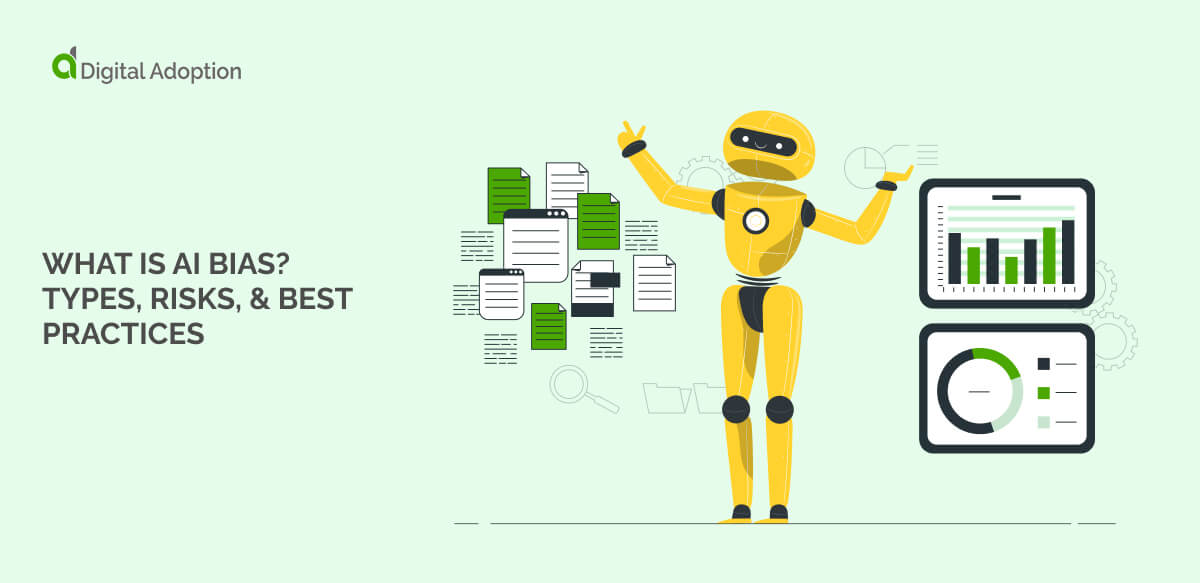According to recent data from Statista, a whopping 137.7 billion U.S. dollars was lost between 2020 and 2021 due to the coronavirus pandemic.
Consistently undergoing periods of digital transformation is crucial for the airline industry to survive and succeed in the long run. In the past, airlines have utilized digital tools to remain competitive and reduce operational costs. With those same digital technologies becoming more pervasive and integrated into operational processes, airlines must take the digital transformation plunge to remain relevant and profitable in the years to come.
The increasing demand for personalized travel experiences, coupled with technological advancements, has created a need for airlines to embrace digital transformation meaningfully. By integrating digital technology across all facets of their operations, airlines can enhance IT efficiency, improve customer experience, and ensure passenger safety.
This article will discuss the importance of digital transformation in the airline industry and provide practical steps that airlines can take to ensure a successful transition. It’s important to note that the digital transformation process is ongoing; airlines must continually revisit and refine their strategies to remain competitive.
- How does digital transformation affect the airline industry?
- Key digital aviation advancements
- The digital transformation of the airline industry explained
- Airline digital transformation industry use cases
- Practical steps that airlines can take to ensure a successful digital transformation
- Airline digital transformation: What’s next?
How does digital transformation affect the airline industry?
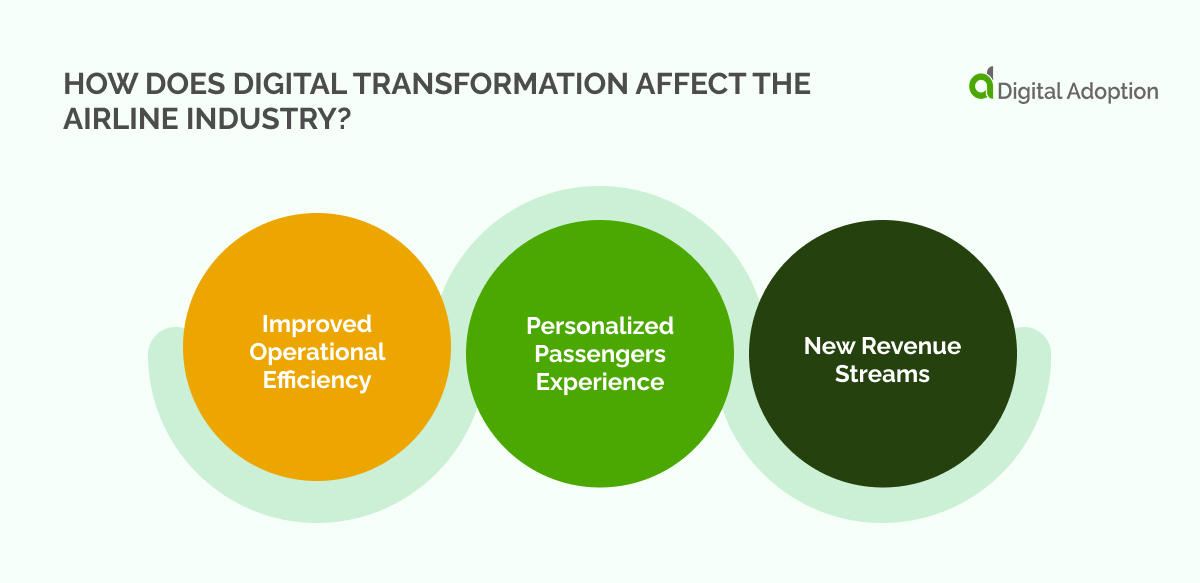
Advanced technologies like cloud computing, big data analytics, AI, machine learning, and IoT have helped the airline industry undergo a huge digital transformation. These technologies have enabled airlines to collect, analyze, and act on vast amounts of real-time data, fundamentally changing how the industry operates.
Some of the main ways in which digital transformation impacts the airline industry are listed below:
Improved Operational Efficiency:
- Big data analytics and machine learning algorithms have helped airlines to optimize flight schedules and routes, minimize fuel consumption, and reduce delays.
- IoT devices can monitor aircraft performance, detect maintenance issues, and perform predictive maintenance, allowing airlines to reduce downtime and improve safety.
Personalized Passengers Experience:
- Airlines use AI-powered chatbots and virtual assistants to provide passengers with real-time assistance.
- Mobile apps allow customers to book flights, manage itineraries, and access other travel-related services.
- Airlines can create tailored offers and promotions by analyzing customer preferences and behaviors, improving customer satisfaction and loyalty.
New Revenue Streams:
- Leveraging big data analytics and AI technologies, airlines can identify opportunities for upselling and cross-selling, such as offering premium seats or in-flight services.
- Using IoT devices to collect data on passenger behavior and preferences can help inform the development of new products and services.
Key digital aviation advancements
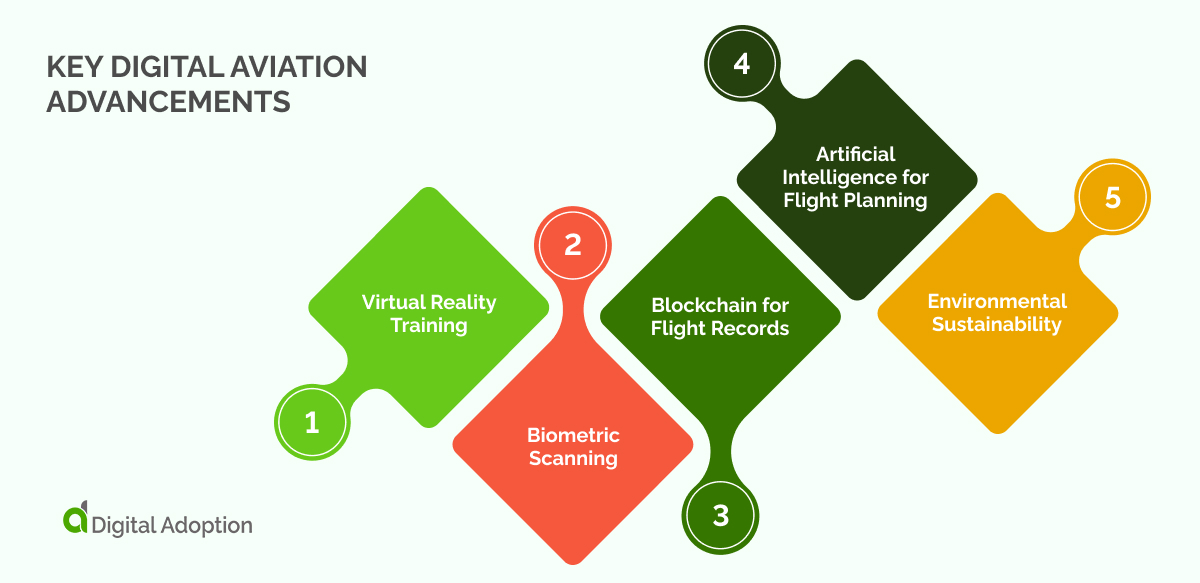
The aviation industry has been soaring to new heights with advancements in digital technology. These cutting-edge innovations have transformed how passengers travel and improved flight safety, efficiency, and comfort.
Here are some of the most creative and unique digital advancements that have taken flight in the aviation industry:
- Virtual Reality Training: Virtual reality technology is being used to simulate real-life scenarios for pilots and flight attendants. These simulations help them build skills, react quickly, and learn from mistakes in a safe environment.
- Biometric Scanning: Biometric scanning has become more prevalent in airports, allowing for seamless check-ins, security screenings, and boarding pass verification. Passengers can use facial recognition, fingerprint, or iris scanning to speed up the process.
- Blockchain for Flight Records: Records and maintenance history are securely stored using blockchain technology. This creates an easily accessible record that is tamper-proof and can only be accessed by authorized parties. This enhances efficiency and lowers the risk of errors or fraud.
- Artificial Intelligence for Flight Planning: AI algorithms optimize flight routes, fuel consumption, and other variables to increase efficiency and reduce costs. This technology also helps pilots anticipate potential hazards and make better-informed decisions during flights.
- Environmental Sustainability: Airlines use digital technology to reduce their carbon footprint and improve sustainability. This includes using renewable energy sources, reducing waste, and using electric or hybrid aircraft.
The digital transformation of the airline industry explained
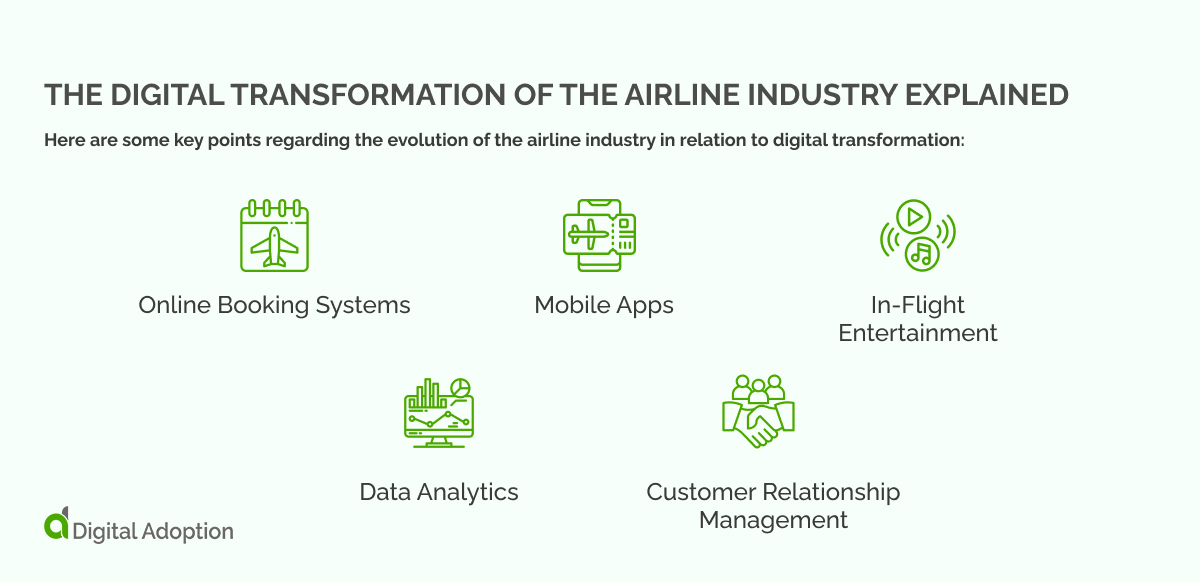
The airline industry has undergone significant changes in recent years due to digital transformation. From booking flights to in-flight entertainment, airlines have embraced technology in various areas to enhance customer experience and improve operational efficiency.
Here are some key points regarding the evolution of the airline industry in relation to digital transformation:
Online Booking Systems
The introduction of online booking systems has been a game-changer for the airline industry. With the rise of the internet, customers can now easily book flights from the comfort of their homes or offices without needing to go to a travel agent or airport.
Airlines quickly recognized the potential of this new technology and began investing heavily in user-friendly websites and mobile apps. This shift to online booking systems has led to faster ticket sales, lower costs, and increased airline revenue.
Mobile Apps
Mobile apps have become essential to modern life, and airlines have leveraged this technology to provide better customer service. Most airlines now offer their own mobile apps that allow passengers to access flight information, check in, and receive boarding passes.
Some airlines have also integrated additional features in their apps, such as baggage tracking and in-flight entertainment. Mobile apps have improved the customer experience and reduced airline operational costs by eliminating the need for printed boarding passes and other paper documents.
In-Flight Entertainment
In-flight entertainment has come a long way since the days of shared screens and limited options. With the advent of personal devices and internet connectivity, airlines have transformed the in-flight entertainment experience.
Passengers can now access various movies, TV shows, games, and music through their personal devices or seat-back screens.
Airline companies have invested heavily in upgrading their in-flight entertainment systems to keep pace with customer demands and offer a better flying experience.
Data Analytics
Data analytics has emerged as a crucial tool for airlines to improve operations and boost revenue. Airlines can make informed decisions about pricing, route planning, and marketing by analyzing data from various sources, such as flight schedules, customer behavior, and social media.
Data analytics can also predict future demand and optimize flight schedules, reducing costs and improving efficiency.
Customer Relationship Management
Customer relationship management (CRM) has become integral to the airline industry’s digital transformation journey. By collecting and analyzing customer data, airlines can gain insights into their preferences and tailor their services accordingly.
CRM systems can also help airlines personalize their marketing campaigns and offer targeted promotions to loyal customers. Improved customer relationships lead to increased revenue and loyalty, and airlines have invested heavily in CRM systems to achieve these goals.
Airline digital transformation industry use cases
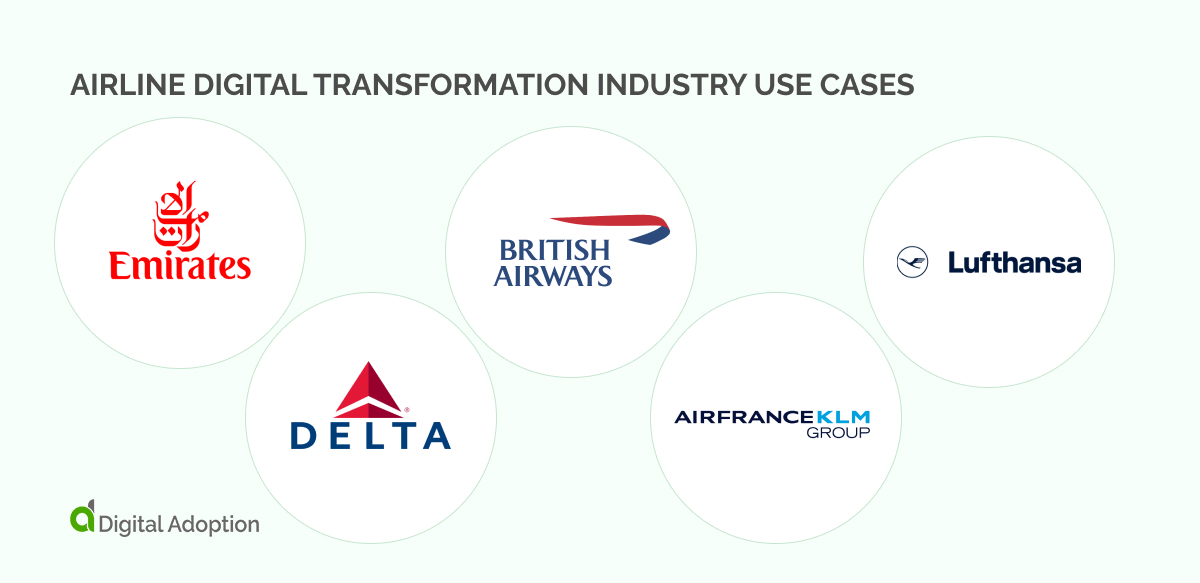
We have compiled a list of companies in the airline industry that have implemented digital transformation and described the changes they have made.
Emirates Airlines
Emirates Airlines has leveraged digital transformation to offer its customers enhanced convenience and personalized experiences. The airline’s mobile app allows passengers to manage bookings, check flight status, and access entertainment options, reducing dependency on traditional paper-based processes.
Emirates Airlines has also invested in advanced systems that provide passengers with real-time updates on flight status while improving the efficiency of operations. Moreover, the airline has used digital marketing to increase its reach and revenue.
Delta Air Lines
Delta Air Lines has embraced digital transformation by implementing various technological initiatives to enhance the customer experience and streamline operations. Delta offers passengers self-service options such as mobile apps, kiosks, and baggage tracking, reducing costs and wait times.
Delta has also leveraged data analytics and artificial intelligence (AI) to optimize flight scheduling and maintenance and personalize the customer experience. For example, their proactive rebooking tool uses AI to reduce wait times and improve customer satisfaction rates.
British Airways
British Airways has implemented digital transformation strategies to improve the customer experience through personalization and convenience. The airline has introduced self-check-in kiosks, mobile apps, and onboard Wi-Fi, enabling passengers to stay connected and entertain themselves during flights.
British Airways has leveraged data analytics and machine learning to optimize flight schedules, personalize the customer experience, and reduce operational costs. For instance, their “Know Me” program uses data to recognize and address individual customer needs, while eCommerce and social media have helped expand the airline’s reach.
Lufthansa
Lufthansa has embraced digital transformation by introducing self-check-in kiosks, mobile apps, and automated baggage systems. These innovations have streamlined operations and reduced costs while providing passengers an enhanced travel experience. Moreover, Lufthansa has leveraged data analytics and machine learning to optimize flight schedules, improve predictive maintenance, and personalize the passenger experience.
Their “Flightpass” program offers personalized flight packages based on individual preferences and travel patterns while investing in eCommerce and social media has helped the airline reach new customers.
Air France-KLM
Air France-KLM has embraced digital transformation by investing in technologies that provide passengers with enhanced convenience and personalized experiences. The airline’s mobile apps, self-service kiosks, and onboard Wi-Fi allow passengers to stay entertained and connected during flights, reducing costs and wait times.
Air France-KLM leverages data analytics and machine learning to optimize flight schedules and personalize the customer experience. Their “Best Offers” program uses data to offer personalized flight packages based on individual preferences and travel patterns. Furthermore, Air France-KLM has invested in eCommerce and social media to expand its reach and enhance customer engagement.
Practical steps that airlines can take to ensure a successful digital transformation
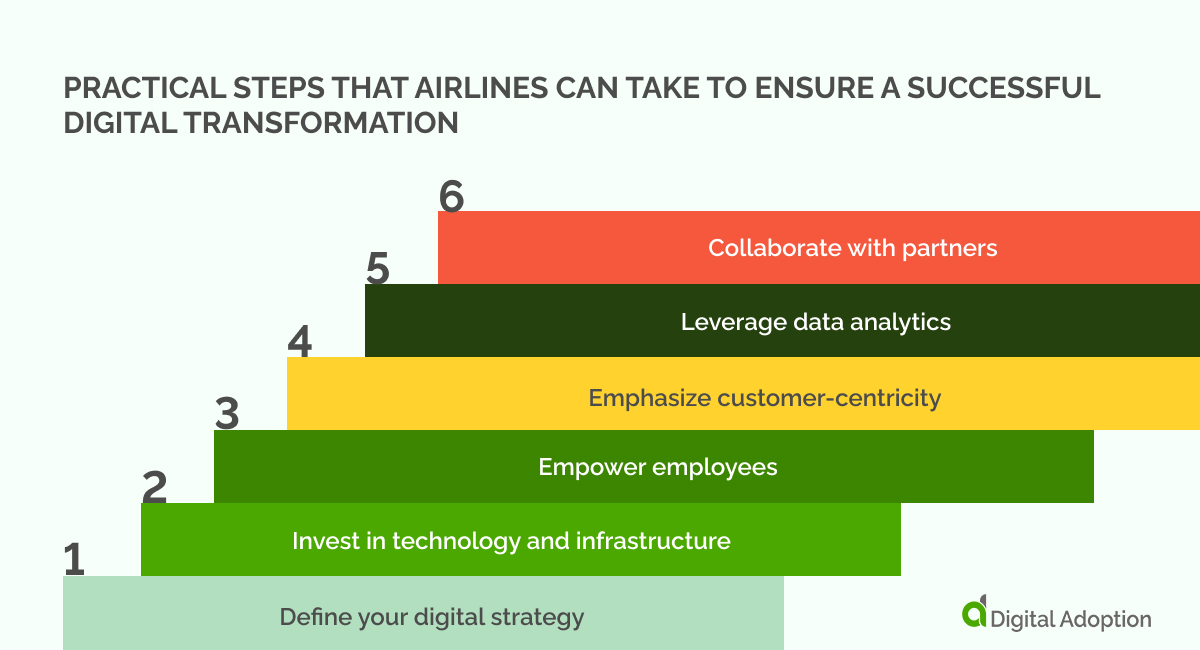
Digital transformation in the airline industry is crucial for staying competitive and meeting customer expectations.
With the advancement of technology, airlines can improve the passenger experience, increase operational efficiency and generate new revenue streams.
However, a digital transformation isn’t easy, and it requires a well-planned strategy, investment, and change management. Here are some practical steps that airlines can take to ensure a successful digital transformation transition:
- Define your digital strategy: The first step toward a successful digital transformation is to define a clear strategy that aligns with your business objectives and customer needs. This should include identifying areas where digital technology can make the biggest impact, such as personalization, automation, and data analytics. It’s also essential to prioritize investments based on ROI and create a roadmap for implementation.
- Invest in technology and infrastructure: A successful digital transformation requires investment in technology and infrastructure. This includes upgrading legacy systems, implementing cloud-based solutions, and integrating multiple platforms. Airlines should also invest in cybersecurity measures to protect against cyber threats and data breaches.
- Empower employees: Digital transformation is not just about technology; it’s also about people. Airlines should invest in employee training and development to ensure they have the skills and knowledge necessary to adapt to new technologies and processes. Employees should also be involved in the planning and implementation to ensure buy-in and alignment with the company’s goals.
- Emphasize customer-centricity: Digital transformation should be focused on improving the customer experience. Airlines should use technology to personalize the passenger journey, from booking to post-flight follow-up. This could include AI-powered chatbots, mobile check-in, and personalized loyalty programs.
- Leverage data analytics: Data analytics is critical for a successful digital transformation. Airlines should collect and analyze customer data to drive personalized experiences, improve operational efficiency, and identify new revenue streams. This includes using predictive analytics to optimize flight schedules and pricing strategies.
- Collaborate with partners: Airlines should collaborate with partners, including technology providers, to accelerate their digital transformation journey. This includes forming strategic partnerships with startups and other innovators to bring new ideas and solutions to the industry.
Airline digital transformation: What’s next?
The airline industry continues navigating a rapidly changing landscape, and digital transformation has emerged as a critical component for success. Implementing cutting-edge technologies such as predictive maintenance, augmented reality, blockchain, robotics, and biometrics is expected to revolutionize various aspects of the airline industry.
These digital technologies have the potential to enhance the efficiency of operations, optimize maintenance schedules, improve customer experience, and increase safety. For instance, augmented reality can provide an immersive experience for passengers, while predictive maintenance can help airlines avoid downtime due to equipment failure. Blockchain technology can improve transaction transparency and security, while biometric technology can streamline airport processes.
It is clear that the adoption of digital technologies will continue to be a key driver of innovation in the airline industry. As airlines strive to remain competitive and agile in the face of uncertainty, investing in digital transformation will be crucial. By leveraging advanced technologies, airlines can gain a competitive advantage while providing customers with a more seamless and personalized travel experience.
The airline industry’s future hinges on its ability to embrace digital transformation. Airlines must keep pace with technological advancements to remain relevant in a rapidly changing world. Those who successfully navigate this shift will be well-positioned to thrive in an industry defined by innovation, agility, and customer-centricity.

